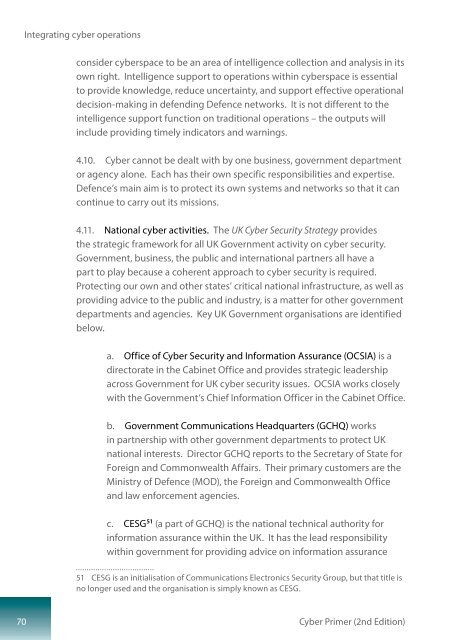Cyber Primer
AEWhbF
AEWhbF
Create successful ePaper yourself
Turn your PDF publications into a flip-book with our unique Google optimized e-Paper software.
Integrating cyber operations<br />
consider cyberspace to be an area of intelligence collection and analysis in its<br />
own right. Intelligence support to operations within cyberspace is essential<br />
to provide knowledge, reduce uncertainty, and support effective operational<br />
decision-making in defending Defence networks. It is not different to the<br />
intelligence support function on traditional operations – the outputs will<br />
include providing timely indicators and warnings.<br />
4.10. <strong>Cyber</strong> cannot be dealt with by one business, government department<br />
or agency alone. Each has their own specific responsibilities and expertise.<br />
Defence’s main aim is to protect its own systems and networks so that it can<br />
continue to carry out its missions.<br />
4.11. National cyber activities. The UK <strong>Cyber</strong> Security Strategy provides<br />
the strategic framework for all UK Government activity on cyber security.<br />
Government, business, the public and international partners all have a<br />
part to play because a coherent approach to cyber security is required.<br />
Protecting our own and other states’ critical national infrastructure, as well as<br />
providing advice to the public and industry, is a matter for other government<br />
departments and agencies. Key UK Government organisations are identified<br />
below.<br />
a. Office of <strong>Cyber</strong> Security and Information Assurance (OCSIA) is a<br />
directorate in the Cabinet Office and provides strategic leadership<br />
across Government for UK cyber security issues. OCSIA works closely<br />
with the Government’s Chief Information Officer in the Cabinet Office.<br />
b. Government Communications Headquarters (GCHQ) works<br />
in partnership with other government departments to protect UK<br />
national interests. Director GCHQ reports to the Secretary of State for<br />
Foreign and Commonwealth Affairs. Their primary customers are the<br />
Ministry of Defence (MOD), the Foreign and Commonwealth Office<br />
and law enforcement agencies.<br />
c. CESG 51 (a part of GCHQ) is the national technical authority for<br />
information assurance within the UK. It has the lead responsibility<br />
within government for providing advice on information assurance<br />
51 CESG is an initialisation of Communications Electronics Security Group, but that title is<br />
no longer used and the organisation is simply known as CESG.<br />
70<br />
<strong>Cyber</strong> <strong>Primer</strong> (2nd Edition)


